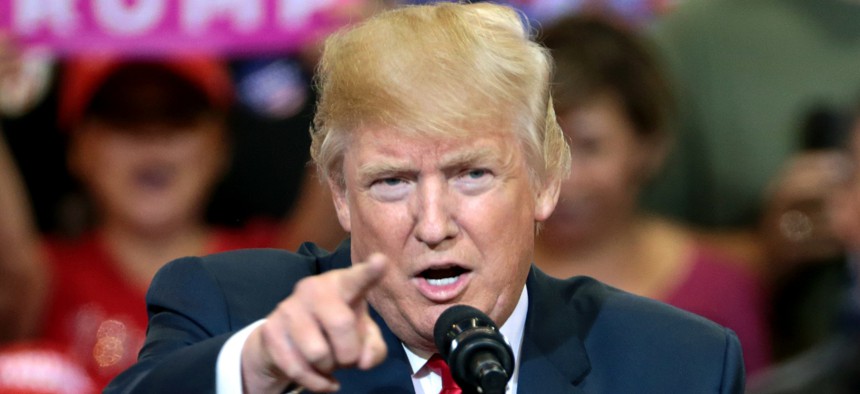
Flickr user Gage Skidmore
Federal Employees, You’ve Got Some Explaining to Do
Showing the leaders of the new administration what they can do--and what they can’t--is more important than ever.
In the final stretch of the presidential campaign, Government Executive’s research arm, the Government Business Council, conducted a survey of federal employees which covered not only their presidential preferences (Hillary Clinton by a wide margin), but their attitudes on serving the next administration. More than a quarter of those who responded said they would consider leaving their jobs if Donald Trump were elected president.
But 65 percent of feds said they weren’t going anywhere. Indeed, if history is a guide, there won’t be a mass exodus of career government employees in the Trump administration. In some agencies and offices, the alignment between the bureaucracy and Trump’s positions is so far off you can expect a significant number of employees to move on, but these will likely be the exception, not the rule.
That’s a good thing, because if ever an administration needed a seasoned group of government employees to show them the ropes, it’s this one. By the end of the first week after the election, Trump had not named a single individual with any experience in government to an official post in his administration. And many of the names floated for high-ranking slots are currently in the business world, with little or no knowledge of the inner workings of government.
Some of the people under consideration for Cabinet posts apparently came to the conclusion that a lack of government experience was a disqualifying liability. Former GOP presidential contender and Trump adviser Ben Carson, reportedly a candidate to head the Health and Human Services Department, took himself out of the running on the grounds that he didn’t have a background in public service.
"Dr. Carson feels he has no government experience, he's never run a federal agency,” his adviser Armstrong Williams told The Hill. “The last thing he would want to do was take a position that could cripple the presidency."
Of course, it’s unlikely that Trump will restrict himself to appointees with experience running federal agencies. In fact, all indications are that many, if not most of Trump’s appointees will have a steep learning curve when it comes to understanding how things get done (and don’t get done) in the federal bureaucracy.
That’s where federal employees come in--especially managers and executives. “The new administration is going to come in with its goals, and it’s the duty of the [Senior Executive Service] to help implement them,” says Bill Valdez, a former Energy Department executive who now serves as president of the Senior Executives Association. Trump’s appointees may lack experience in federal operations, he said, but that’s “fairly typical of any administration.”
That may be true, but we’ve also never had a president with no government or military background, whose previous interactions with the bureaucracy involve negotiating a deal to redevelop a piece of federal property, and whose approach to management is driven entirely by his experience in the corporate world. If Trump appoints people like himself, they are likely to need extensive help in understanding exactly what the agencies they have been named to lead do, and how they do it.
Likewise, it’s incumbent on federal managers and executives to explain what isn’t allowed by law, regulation and executive order. (Only the last of those can easily be changed.) That includes everything from explaining the legislation governing an agency’s operations to reminding appointees of ethics restrictions.
Career federal employees take very seriously their obligation to implement a president’s agenda regardless of whether or not they agree with it. That principle may be put to the test in the Trump administration. Some employees will doubtless conclude that they don’t want to serve this president. Those who remain have a big job ahead of them.
Photo: Flickr user Gage Skidmore
NEXT STORY: The Trump Transition Goes Digital







